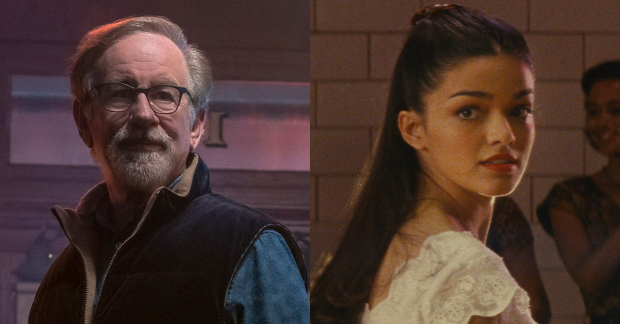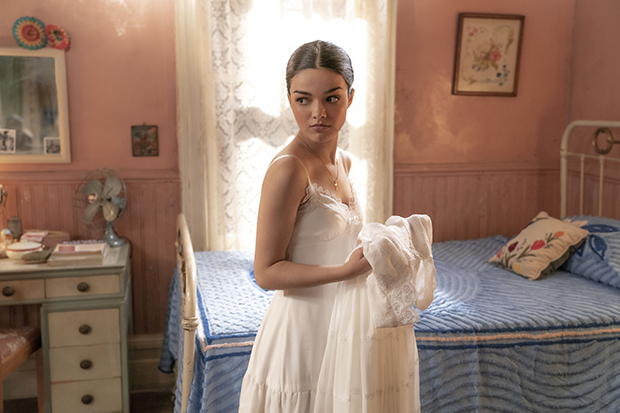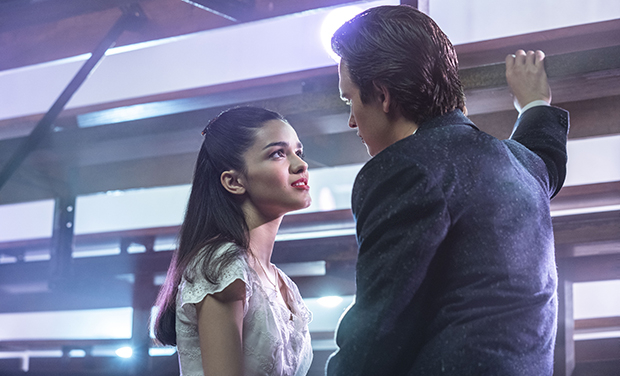Interview: Steven Spielberg and Rachel Zegler Discuss Sondheim's Impact on West Side Story
Steven Spielberg's new film adaptation of West Side Story hits cinemas on December 10, and the finished product will be a haven for theater fans. In addition to a cast made up of mostly Broadway names (including Ariana DeBose as Anita, Mike Faist as Riff, and David Alvarez as Bernardo, joining newcomer Rachel Zegler as Maria and Ansel Elgort as Tony), Spielberg loaded his creative team with Broadway vets, starting with screenwriter Tony Kushner. Not only that, but it was one of the last major projects to feature on-the-ground support from lyricist Stephen Sondheim, who, at the time of filming, was the last-surviving member of the original creative team.
Here, Spielberg and Zegler discuss Sondheim's impact on the work, and why it was important for the new movie to pay homage to West Side Story's life on Broadway.

(© Niko Tavernise/20th Century Studios)
This conversation has been condensed and edited for clarity.
In addition to Tony Kushner writing the screenplay, almost the entire cast and creative team have some tangible connection to the world of theater. Why was that important to you as director?
Steven Spielberg: I've never made a musical before, and I wanted people who are on the boards…I have not been on the boards since I was the stage manager of Arsenic and Old Lace as a sophomore in high school. I surrounded myself with Justin Peck, from New York City Ballet, as the choreographer; Jeanine Tesori, of Fun Home and Caroline, or Change as the vocal producer, Paul Tazewell, who did the costumes for Hamilton. I was bringing my film sensibility to their theater gravitas. I think the best choice I could make was bringing myself to theater, not asking theater to come to me.
Rachel Zegler: It was so wonderful to watch the piece of art that I loved so much growing up evolve into something that I love even more now. With Tony's script, with Steven's direction, with everyone Steven juts named. I got to work with Jeanine Tesori, who was my hero from a very young age. Getting to work with her and getting to call her my friend is something that I will not be able to live down, truly.
Steven: I feel the same way.

(© NIko Tavernise
Rachel, tell me about your lifelong association with this musical.
Rachel: West Side Story was a very integral part of my upbringing. It was the first time I had seen my culture represented in any way on screen. And obviously, Rita Moreno being the pioneer she is, it was so wonderful to be able to share the screen with her. I didn't really get to share the screen with her for long but getting to share a set with her was incredible.
West Side Story is a beautiful tale about love prevailing over hatred, and I think it's never been more poignant, but it's also never stopped being poignant. That's why it followed me my entire career. I played Maria on stage when I was 16, and I had such an interesting experience doing it on stage that I almost didn't send in my tape for this film, because I felt so oversaturated with West Side Story. I'm so glad that I did, obviously, because I wouldn't be here today if I didn't.
Steven: I'm so glad that you did.

(© Niko Tavernise)
Stephen Sondheim was very involved with musical aspects of the film. Looking back following his passing, what was he like to work with?
Steven: Steve and I became friends on West Side Story, but we became really good friends during the pandemic, when I realized that he was as much as a cineaste as myself and Guillermo del Toro and Marty Scorsese and a few other friends of mine, who are obsessed with the old movies.
Rachel: Imagine that group chat.
Steven: Oh, my god. So Stephen and I kept in touch for almost a year and a half, several times a week on the phone, mainly on emails, recommending films for each other to see, and Stephen basically telling me things about the sixth cast member in the deep back field of a cast, who the person was, who the person got married to, how long their career lasted. It was preternatural, his recollection and his ability to retain a card catalogue of every single movie he's ever seen from the 30s, 40s, 50s, and parts of the 60s. And not just American film, but international film. We hit it off. That's when we really solidified our relationship.
Rachel: Steve Sondheim got me into musical theater. I was very young and should not have been listening to Sweeney Todd, but I would dance around my room singing "A Little Priest," not realizing that they were singing about eating people. Getting to be in the same with him was enough to have all the air escape from my lungs. He told Ansel [Elgort], which is something that I really loved, that the greatest thing a performer could have is confidence. And it was one of those things that stuck with me. But also, his old fashioned-jess. He didn't compliment you to your face. I remember when Ariana [DeBose] and I did "A Boy Like That/I Have A Love" in the recording studio, he left after our first pass. When we passed him on the stage, he said "Don't listen to a word he says," and you came in and you were like "He said it was so good he didn't have to stay any longer.
Steven: True. Steve would turn to me, when Ariana and Rachel were both performing in the recording studio — he was there every day for three weeks. We sat next to each other. Certainly, Jeanine Tesori was in the booth with the musical artists, but Steve and I were outside next to the mixing panel, and Steve would turn, and say about Rachel "She sings like an angel. Where did you find her?" And then after the take, he'd come in and he wouldn't even look at Rachel. He would saturate me with compliments about everybody, but he wouldn't interact with the cast. And I think that was professionalism.
Rachel: It was. He kept alive the best parts of the old-fashioned industry, which was just "I'm not gonna gas you up to your face." It was humbling, but at the same time, it was an honor to be considered worthy of a compliment from Stephen Sondheim.










